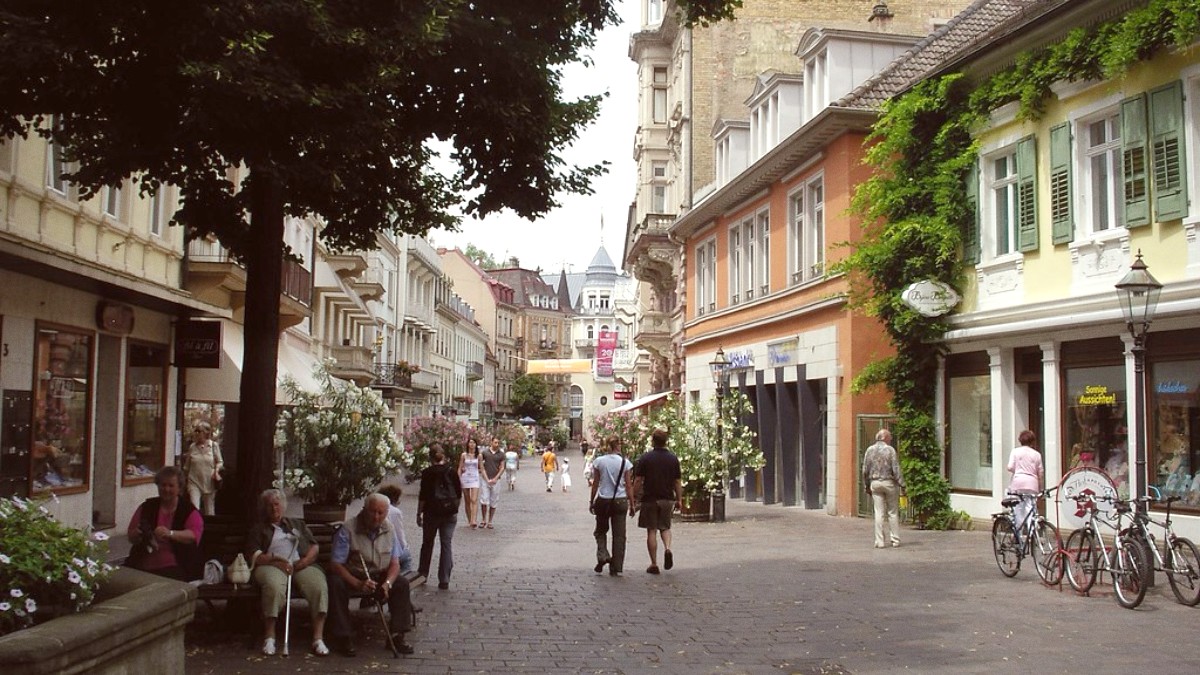
Baden Wurttemberg, Germany
Baden-Baden has several airports that serve it. The closest is Baden Airpark (FKB), located about 15 km (9 miles) west. It caters to low-cost carriers and charter flights from Europe. Frankfurt Airport (FRA), Germany’s largest, is about 170 km (105 miles) north and functions as a major international hub. Stuttgart Airport (STR), 90 km (56 miles) east, handles domestic and European flights. Strasbourg Airport (SXB), France, about 60 km (37 miles) west, is a smaller airport with some European connections.
Direct flights to FKB come mainly from European cities. Direct flights from major global hubs (New York, London, Dubai, Tokyo) typically land at Frankfurt (FRA). Flight prices generally rise during peak summer months (June-August) and around Christmas/New Year holidays. Shoulder seasons (spring and autumn) often give better value. Booking flights in advance, typically 3-6 months, is a good idea to get better rates.
Bus 205/216 to Baden-Baden train station (25-35 min, €4-€5). Taxis (20-25 min, €30-€40). Car rental available.
ICE/IC/EC trains to Baden-Baden Hauptbahnhof (1.5-2.5 hrs, €40-€70). FlixBus (2.5-3.5 hrs, €15-€30). Car rental available.
S-Bahn to Stuttgart Hauptbahnhof, then train to Baden-Baden (1.5-2 hrs, €20-€40). Car rental available.
A major gateway for international travel to Germany.
Frankfurt Airport (FRA) functions as Germany’s largest airport and a major international hub with extensive connections worldwide.
For long-haul international travel to Germany, FRA often serves as the main entry point, with onward connections to Baden-Baden.
Germany’s national railway company, Deutsche Bahn (DB), operates comprehensive services. Baden-Baden Hauptbahnhof acts as a major stop on the ICE (InterCity Express) high-speed network. This connects the city directly to large German cities like Frankfurt, Stuttgart, Hamburg, Berlin, and Munich. International destinations like Basel and Strasbourg also have direct connections.
FlixBus is the dominant long-distance bus operator in Germany and across Europe. FlixBus connections to Baden-Baden are from various German cities and some international destinations. Bus travel generally provides lower prices than trains, though with longer travel times. FlixBus typically stops at Baden-Baden Hauptbahnhof, making connections convenient.
To rent a car, one typically needs to be at least 21 years old (some car classes may require 25, surcharges for under 25). A valid national driver’s license is a must. If your license is not from an EU/EEA country or not in German, English, or French, an International Driving Permit (IDP) must accompany your national license. A major credit card in the main driver’s name is also for the security deposit.
Companies like Avis, Budget, Europcar, Hertz, Sixt, and Enterprise have offices at Baden Airpark (FKB) or Baden-Baden Hauptbahnhof. Booking your rental car in advance is a good idea, especially during peak season. Road conditions are generally very good. Be aware of cyclists. Traffic jams occur around major cities during peak hours.
Baden-Baden is an inland city, located in southwestern Germany. Direct sea or river arrivals are not applicable for reaching Baden-Baden itself. The Oos River flows through the city, but it is a small waterway, not navigable for major passenger ferries or cruise services.
Travelers arriving via a Rhine river cruise would need to arrange onward land transportation to Baden-Baden from these larger port cities. This would mean taking a train, bus, or taxi. No direct water transportation services connect the Rhine to Baden-Baden.
Small waterway, not suitable for major passenger services.
Baden-Baden is situated inland, away from major navigable rivers for direct access.
No direct boat or ferry services connect the Rhine to Baden-Baden.
Germany does not impose specific exit fees or taxes directly on travelers departing the country. Any such charges are typically included in your airfare or ticket prices at the time of purchase. You will not face additional fees upon departure.
Whether you leave by air, train, or bus, knowing what to expect helps you organize your final steps.
Major airports come with various facilities for departing travelers, including duty-free shops, restaurants, cafes.
Currency exchange services and lounges are also available at larger airports.
Train stations give amenities like shops for last-minute snacks or reading material, eateries, and restrooms. Larger stations may also have luggage storage facilities.
Allow time for check-in, security screening, and customs procedures (if leaving the Schengen zone).